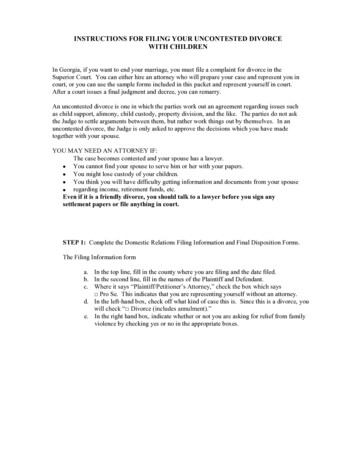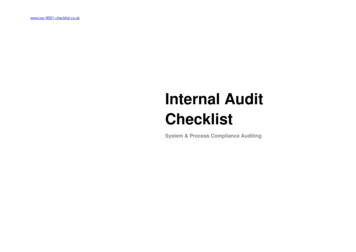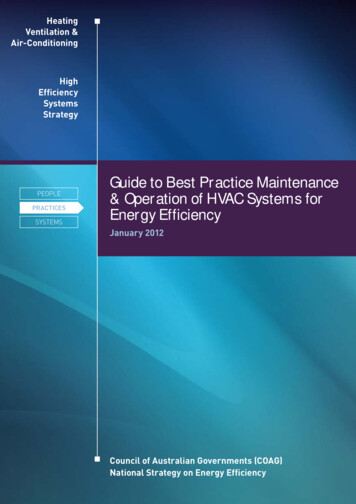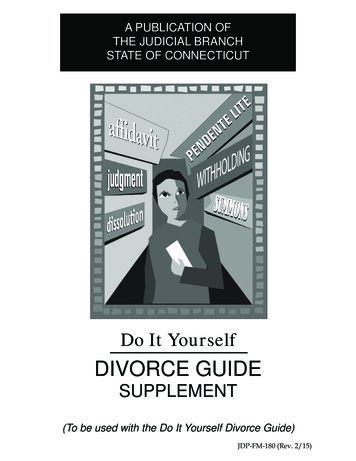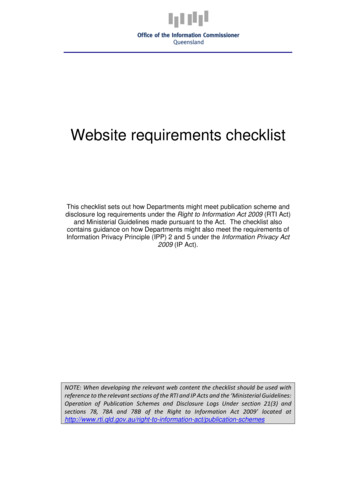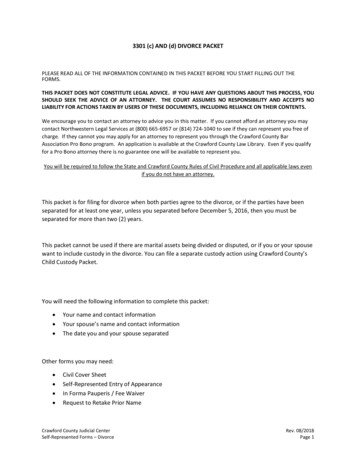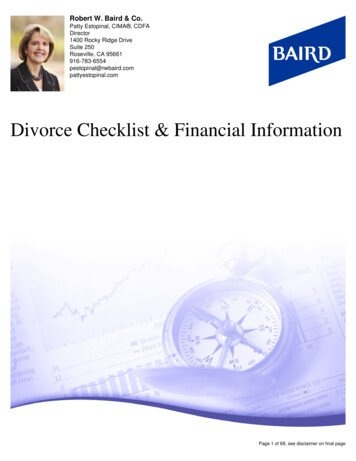
Transcription
Robert W. Baird & Co.Patty Estopinal, CIMA , CDFADirector1400 Rocky Ridge DriveSuite 250Roseville, CA nal.comDivorce Checklist & Financial InformationPage 1 of 68, see disclaimer on final page
Table of ContentsGetting Divorced Checklist . 3Dealing with Divorce . 6Insurance Concerns of Divorcing Couples . 8Health Insurance and Divorce . 10Life Insurance at Various Life Stages . 12Life Insurance Basics .14Establishing a Budget . 17Choosing a Beneficiary for Your IRA or 401(k) .18Choosing an Income Tax Filing Status . 20Planning Concerns of Divorcing Couples . 22Divorce and Estate Planning . 26Divorce and Social Security .27Divorce and Risk Management .29Divorce and Debt . 32New and Continuing Needs for Life Insurance in Divorce . 35Alimony: Tax Planning . 38Child Support: Tax Planning . 42Dependency Exemptions: Divorce .47Property Settlements and Third-Party Transfers . 48Qualified Domestic Relations Order (QDRO) . 56Filing Status Considerations: Divorce .59Am I liable for my spouse's debts? . 62My husband and I are divorcing after 30 years of marriage. Will I still be able to receive Social Securityretirement benefits based on his earnings record after our divorce? .63My husband and I are divorcing. Whose health insurance policy will cover the children? . 64How do I protect my assets in the event of a divorce? . 65Are alimony payments considered taxable income? . 66What are the tax implications of child support payments? .67Page 2 of 68, see disclaimer on final page
Getting Divorced ChecklistYesNoN/AYesNoN/AYesNoN/AGeneral information1. Has relevant personal information been gathered? Each spouse's name, date of birth, and Social Security number Names and birth dates of children Date and place of marriage and length of time in present state Information about prior marriages and children Date of separation and grounds for divorce Current occupation of spouses and name/address of employers Education and degrees of each spouse Name, address, and telephone number of attorney2. Has financial situation been assessed? Income of each spouse Expenses of each spouse Assets of the spouses (joint and separate) Liabilities of each spouse Employee benefits each spouse is entitled to Life, health, and disability insurance policies owned by each spouse Credit reportsNotes:Property settlements1. Does prenuptial agreement exist?2. Do spouses reside in a community property state?3. Have all assets been listed, valued, and classified as joint orseparate?4. Have the tax bases of all assets been determined?5. If assets will be transferred or sold, have tax consequences beencalculated and explained to client?6. Have loans and other liabilities on the properties (or otherwise) beenlisted and considered?7. Is there a family business?Notes:Alimony and child supportPage 3 of 68, see disclaimer on final page
1. Have tax consequences of classifying support as alimony or childsupport been reviewed?2. Has physical custody of children been determined?3. Has legal custody of children been determined?4. Have visitation parameters been established for the noncustodialparent?5. Will alimony be paid?Notes:Marital homeYesNoN/AYesNoN/A1. Will home be transferred to either spouse as part of settlement?2. If yes, has cost basis been reviewed for improvements?3. Has amount of outstanding mortgage been calculated?4. Will the principal residence be sold to a third party?5. If yes, has the tax cost (if any) been computed?Notes:Retirement planning1. Have retirement plans been listed and interests in retirement plansbeen reviewed?2. Will the divorce decree provide a payout from the plan? If so, will aqualified domestic relations order (QDRO) be used?3. Should beneficiary designations be changed?4. Will any IRS penalties apply?5. Can retirement money be rolled over to IRA?Notes:Page 4 of 68, see disclaimer on final page
Tax planningYesNoN/AYesNoN/A1. If already divorced, was divorce finalized by year-end?2. If still married at year-end, agree to file jointly?3. Have joint filing risks been discussed?4. Has separate maintenance decree been obtained to permit filing asunmarried or head of household?5. Have head of household conditions been met?6. Has it been decided which spouse will get dependency exemption?Notes:Other1. Should will and trust be changed?2. Should insurance policy beneficiaries be changed?3. Should banks and other creditors be notified of divorce and signatureschanged?4. Will either spouse's health insurance plan cover the childrenpost-divorce? Cover spouse?5. Has budget been revised to account for changes in income andliabilities?6. Does credit need to be repaired or established?Notes:Page 5 of 68, see disclaimer on final page
Dealing with DivorceDivorce can be a lengthy process that may strain your finances and leave you feeling out of control. But with the right preparation,you can protect your interests, take charge of your future, and save yourself time and money. You certainly never expecteddivorce when you cut the wedding cake--you and your spouse planned on spending the rest of your lives together. Unfortunately,the fairy tale didn't work out, and you're headed for a divorce. So where do you begin?First things first: should you hire an attorney?There's no legal requirement that you hire an attorney when divorcing. In fact, going it alone may be a sensible option if you'reyoung and have been married only a short time, are childless, and have few assets. However, most divorcing couples hireattorneys to better protect their interests, even though doing so can be expensive. Divorce attorneys typically charge hourly ratesand require you to submit retainers (lump sums) up front. The charges will depend on the complexity of the case, the reputationand experience of the divorce attorney, and your geographic location.You should know that if you're a homemaker or earn less income than your spouse, it's still possible to obtain legal representation.You can submit a motion to the court, asking a judge to order your spouse to pay for your attorney's fees.If you and your spouse can agree on most issues, you may save time and money by filing an uncontested divorce. If you can'tagree on significant issues, you may want to meet with a divorce mediator, who can help you resolve issues that the two of youcan't resolve alone. To find a mediator, contact your local domestic relations court, ask friends for a referral, or look in thetelephone book. Certain attorneys, members of the clergy, psychologists, social workers, marriage counselors, and financialprofessionals may offer their services as mediators.Save time and money by doing your homework before meetingwith a divorce professionalTo save time and money, compile as much of the following information as you can before meeting with an attorney or otherdivorce professional: Each spouse's date of birth Names and birthdates of children, if you have any Date and place of marriage and length of time in present state Existence of prenuptial agreement Information about parties' prior marriages, children, etc. Date of separation and grounds for divorce Current occupation and name and address of employer for each spouse Social Security number for each spouse Income of each spouse Education, degrees, and training of each spouse Extent of employee benefits for each spouse Details of retirement plans for each spouse Joint assets of the parties Liabilities and debts of each spouse Life (and other) insurance of each spouse Separate or personal assets of each spouse, including trust funds and inheritances Financial records Family business records Collections, artwork, and antiquesIf you're uncertain about some of these areas, you can obtain the necessary information through your spouse's financial affidavitPage 6 of 68, see disclaimer on final page
and/or the discovery process, both of which are mandated by the court.Consider the big questions, such as child custody and alimonyAlthough your divorce professional will help you work through the big issues, you might want to think about the following questionsbefore meeting with him or her: If you have children, what are your wishes regarding custody, visitation, and child support?Whose health insurance plan should cover the children?Do you earn enough money to adequately support yourself, or should alimony be considered?Which assets do you really want, and which are you willing to let your spouse keep?How do you feel about the family home? Do you feel strongly about living there, or should it be sold or allotted to yourspouse? Will you have enough money to pay the outstanding debt on whatever assets you keep?In addition to an attorney, you may want to see a therapist to help you clarify your wishes, express yourself more clearly, and dealwith any child-related issues. Such counseling is typically covered by health insurance.Some dos and don'ts when divorcingKeep the following tips in mind: Do prepare a budget and a financial plan to sustain you until your divorce is final. Get help if you don't currently have theskills and energy to do this on your own. Do review monthly bank and financial statements and make copies for your attorney. Do review all tax returns that have been filed jointly or separately by your spouse. Do make sure all taxes have been paid to date. Do review the contents of any safe-deposit boxes. Do get emotional support for yourself--talk to friends, join a support group, or see a therapist. Don't make large purchases or create additional debt that might later cause financial hardship. Don't quit your job. Don't move out of the house before consulting your attorney. Don't transfer or give away assets that are owned jointly. Don't sign a blank financial statement or any other document without reviewing it with your attorney.Page 7 of 68, see disclaimer on final page
Insurance Concerns of Divorcing CouplesFew life changes are of more consequence than a divorce. In addition to the financial and emotional difficulties, you'll face specialconcerns about your insurance coverage. Planning for these changes should begin long before the divorce is final. The selectionof life and health insurance beneficiaries may have to be revised. If you have children, many of your insurance concerns willcenter on whether you are granted custody. And because it's common while married for one spouse to maintain health insurancefor the family, the breakup of a marriage can have serious insurance consequences for the other spouse, especially if he or shewas not employed outside the home.Protecting alimony and child support paymentsThe spouse given custody of the children (custodial parent) should make sure that the life of the noncustodial parent is insured. Ifyou're the custodial parent, you don't want to end up in a position where child support payments suddenly end because yourex-spouse dies. The same thing applies to alimony payments. Life insurance can protect you and your children in case of untimelydeath. Some agreements require the noncustodial parent to pay for a policy on his or her life and to name the custodial parent asbeneficiary. Your agreement should also state that you periodically receive proof that the policy is still in force.If you're the custodial parentIf you're receiving alimony or child support payments, purchasing a life insurance policy on your former spouse is the easiest wayto protect yourself and your children. If you can't get new insurance on your former spouse, have his or her existing policiestransferred to you as the new policyowner and beneficiary. This can be planned as part of the divorce agreement. Make certainthat you are designated as the outright policyowner or as the irrevocable beneficiary. If you have trouble paying the policypremiums, you can petition the court to have alimony and child support payments increased to cover the cost of insurance. Thecourt may even require your former spouse to pay the premiums. In this case, monitor the policy periodically to make sure that thepayments are being made.If you're the noncustodial parentEven though you don't have custody of your children, you'll want to ensure that they are protected financially. You may also havecertain responsibilities to your former spouse. Insure your obligations by paying for a new policy on your life for the custodialparent. That way, you can keep any policies you currently have and protect your children's future at the same time. The policy canbe given to your former spouse free from gift tax if given either before or as part of the divorce agreement. If the policy is entirelyin your former spouse's name, any premiums you pay will likely be considered alimony for income tax purposes and are taxdeductible. You should also insure the life of your former spouse. Remember that if he or she were to die, you would most likelygain custody of the children, increasing your expenses dramatically.Naming life insurance beneficiaries at divorceChanging the beneficiary on a life insurance policy is as easy as calling up the insurer and requesting the appropriate paperwork.You can designate any person or entity to be the beneficiary, although some states require that the beneficiary have an insurableinterest in your life (i.e., someone to whom you have a financial obligation). But during or after a divorce, your choices may besomewhat limited.If a court has ordered, for instance, that you must continue an existing policy with your former spouse as beneficiary, you cannotchange it. If you're under no such constraints, however, your choice usually boils down to either your estate, your ex-spouse, oryour children. Designating your estate as beneficiary will tie up the insurance proceeds in probate. And unless you need to protectalimony or child support payments, you probably have no need or desire to name your ex-spouse. Designating your children asbeneficiaries may be your best course, but doing so can be very complicated if they are minors. One solution is to create a trustfor the children and name the trust as beneficiary.Note: Divorce laws may differ from one state to the next, so consult an experienced legal professional before proceeding.Health insurance coverage and divorcePage 8 of 68, see disclaimer on final page
Often, one spouse participates in a group health insurance plan at work that provides coverage for both spouses. When a divorceoccurs, coverage for the nonemployee spouse will often end, unless the divorce decree requires continuation of coverage. If thereis no such requirement, temporary protection may be provided by the Consolidated Omnibus Budget Reconciliation Act (COBRA).This federal law protects employees of companies with 20 or more workers and their dependents from losing group insurancecoverage as a result of job loss or divorce. Certain governmental and nonprofit enterprises are exempt. If your former spousemaintained family health coverage through work, you may (at your own expense) continue this group coverage for up to 36months, or until you remarry or get coverage under another group health plan. Several states have enacted laws that may providea former spouse with more generous rights than those under COBRA.Disability income insurance and divorceIf you receive alimony or child support, another risk to your income may arise if your former spouse becomes disabled. If he or shehas no disability insurance and is unable to work, the court may modify the alimony and child support obligation, reducing oreliminating payments to you. With a disability policy, your ex-spouse will receive benefits each month and may be capable ofpaying the same amount of alimony and child support. Planning for disability insurance should be completed before the divorce isfinal. Unlike life insurance, you can't own a disability policy on someone else. So, the divorce decree may require that yourex-spouse pay the premiums on a policy and that you are entitled to regularly receive proof that the policy is in force.Property insurance and divorceReal and personal property must be insured by the actual owner of the property (e.g., a car registered in your name must beowned by you). So, property insurance policies must be modified or rewritten to reflect the proper owner as the insured. Also, if ahusband and a wife enter into an agreement covering their property rights, and divorce occurs within a specified period, alltransfers of property are considered made for full consideration and are not subject to gift tax. With respect to marriedhomeowners, the house can be sold immediately and the proceeds divided. Or, both spouses can continue to own the housejointly with a view toward a future sale. Another alternative is for one spouse to keep the house and buy out the other's interest.Or, the court may award the house to one spouse without trading assets while the title is held by both spouses. If the ownership ischanged, a new deed should be drawn up to reflect the new arrangement, and the homeowners policy should be updated.If you move into an apartment (even temporarily), you should buy renters insurance to cover your possessions.Page 9 of 68, see disclaimer on final page
Health Insurance and DivorceHow will a divorce affect your health insurance coverage? During marriage, it's common for one spouse to maintain healthcoverage for the entire family through his or her group health insurance plan at work. After a divorce, coverage for the otherspouse and the children could terminate. State and federal laws offer protection to families in danger of losing health-carecoverage, especially to children. But it's important to re-examine your family's health insurance situation before a divorce occurs toavoid serious complications afterward.Health insurance coverage can be included in a divorce settlementBecause health coverage is such an important benefit, some divorce decrees stipulate that a spouse who provided healthcoverage for the other spouse or family during the marriage must continue to provide such coverage following a divorce. This isespecially true if the other spouse didn't work outside the home and has no immediate access to health insurance. Neither aninsurer nor an employer can deny such court-ordered coverage when children are involved.If you're the spouse who carries the health coverage, you may have to pay additional premiums to continue coverage for yourex-spouse and your children, depending on the policy provisions. Some group policies will routinely allow you to continue fullcoverage for your family even after your divorce. Of course, this may change if you later remarry and want to include your newfamily on your policy. In any case, the premium for a group family plan may be less expensive than single coverage for two adults.If your family has individual health insuranceIf the issue of health insurance is not included in your divorce settlement, you'll need to do some scrambling around if yourex-spouse is the insured on the family's individual health insurance policy. It's very possible that the coverage provided to you andyour children could be terminated. Talk to your insurance agent to determine if you're still covered, and for how long. If you're stillincluded in the policy, find out how much the premiums will be over the next 6 to 12 months. Also, begin looking into new healthinsurance for you and your children.Secure health coverage for your childrenHopefully, you and your former spouse can work out an agreement regarding health coverage for your children. The child supportsection of the divorce agreement assigns responsibility for providing the children's health insurance. But if the noncustodial parentor that parent's insurance company or employer refuses to cooperate, federal law provides for a court order that secures yourchildren's continued health insurance coverage. This court order, known as a Qualified Medical Child Support Order (QMCSO),stipulates that custodial parents have the right to obtain health insurance coverage for their children through the noncustodialparent's group health plan, if the noncustodial parent has such coverage. The children can't be denied access to the plan,although limitations can be placed on the coverage. The order will not require the plan to provide additional benefits not actuallyoffered in the plan.The QMCSO can require that policy premiums be deducted directly out of the employee's paycheck. Reimbursements for medicalcare are made directly to the custodial (nonemployee) parent, when that parent pays a provider. Also, the noncustodial parentcan't choose a medical plan that is unsuitable for the children. If you're the custodial parent, get copies of your ex-spouse'smedical plan, medical claims and election forms, the summary plan description outlining your former spouse's employee benefits,and the page designating the current insureds of the health plan.Temporary coverage through your former spouse's employerTemporary protection may be available through the Consolidated Omnibus Budget Reconciliation Act (COBRA). This federal lawwas designed to protect employees and their dependents at companies with 20 or more workers from losing group insurancecoverage as a result of job loss or divorce.If your former spouse maintained family health coverage through work, you may (at your own expense) continue this groupcoverage for up to 36 months after the divorce or legal separation. Your cost of continuing COBRA coverage can't exceed 102percent of the cost to the plan for providing identical benefits to an active participant. Be aware that you have the right to pay thepremiums in monthly installments. Also, you must pay premiums on time or you'll lose your coverage. COBRA coverage willterminate sooner than 36 months if you remarry or obtain coverage under another group health plan. Certain governmental plansPage 10 of 68, see disclaimer on final page
and church-sponsored plans are exempt from the act.Several states have enacted their own laws that preserve a spouse's eligibility for health insurance after a separation or divorce.Some of these laws may provide you with rights more generous than those offered under COBRA, so check your state's laws first.Ask your divorce attorney or contact your state insurance commissioner's office.Also, if you're over a certain age, it may be wise to purchase individual health insurance or to make sure your working formerspouse maintains health coverage as part of the divorce settlement. Otherwise, when COBRA coverage terminates after 36months, you may find that poor health in your later years presents an insurability problem or that the cost of coverage isexorbitant. In addition, the Health Insurance Portability and Accountability Act of 1996 may provide certain protection regardingpre-existing conditions.Page 11 of 68, see disclaimer on final page
Life Insurance at Various Life StagesYour need for life insurance changes as your life changes. When you're young, you typically have less need for life insurance, butthat changes as you take on more responsibility and your family grows. Then, as your responsibilities once again begin todiminish, your need for life insurance may decrease. Let's look at how your life insurance needs change throughout your lifetime.Footloose and fancy-freeAs a young adult, you become more independent and self-sufficient. You no longer depend on others for your financial well-being.But in most cases, your death would still not create a financial hardship for others. For most young singles, life insurance is not apriority.Some would argue that you should buy life insurance now, while you're healthy and the rates are low. This may be a validargument if you are at a high risk for developing a medical condition (such as diabetes) later in life. But you should also considerthe earnings you could realize by investing the money now instead of spending it on insurance premiums.If you have a mortgage or other loans that are jointly held with a cosigner, your death would leave the cosigner responsible for theentire debt. You might consider purchasing enough life insurance to cover these debts in the event of your death. Funeralexpenses are also a concern for young singles, but it is typically not advisable to purchase a life insurance policy just for thispurpose, unless paying for your funeral would burden your parents or whomever would be responsible for funeral expenses.Instead, consider investing the money you would have spent on life insurance premiums.Your life insurance needs increase significantly if you are supporting a parent or grandparent, or if you have a child beforemarriage. In these situations, life insurance could provide continued support for your dependent(s) if you were to die.Going to the chapelMarried couples without children typically still have little need for life insurance. If both spouses contribute equally to householdfinances and do not yet own a home, the death of one spouse will usually not be financially catastrophic for the other.Once you buy a house, the situation begins to change. Even if both spouses have well-paying jobs, the burden of a mortgage maybe more than the surviving spouse can afford on a single income. Credit card debt and other debts can contribute to the financialstrain.To make sure either spouse could carry on financially after the death of the other, both of you should probably purchase a modestamount of life insurance. At a minimum, it will provide peace of mind knowing that both you and your spouse are protected.Again, your life insurance needs increase significantly if you are caring for an aging parent, or if you have children beforemarriage. Life insurance becomes extremely important in these situations, because these dependents must be provided for in theevent of your death.Your growing familyWhen you have young children, your life insurance needs reach a climax. In most situations, life insurance for both parents isappropriate.Single-income families are completely dependent on the income of the breadwinner. If he or she dies without life insurance, theconsequences could be disastrous. The death of the stay-at-home spouse would necessitate costly day-care and housekeepingexpenses. Both spouses should carry enough life insurance to cover the lost income or the economic value of lost services thatwould result from their deaths.Dual-income families need life insurance, too. If one spouse dies, it is unlikely that the surviving spouse will be able to keep upwith the household expenses and pay for child care with the remaining income.Moving up the ladderFor many people, career advancement means starting a new job with a new company. At some point, you might even decide toPage 12 of 68, see disclaimer on final page
be your own boss and start your own business. It's important to review your life insurance coverage any time you
Divorce can be a lengthy process that may strain your finances and leave you feeling out of control. But with the right preparation, you can protect your interests, take
